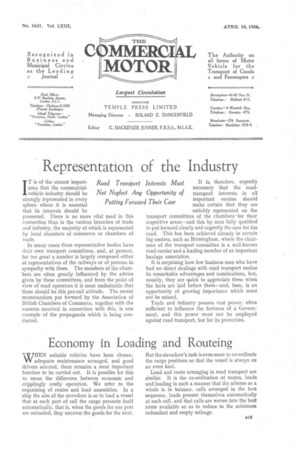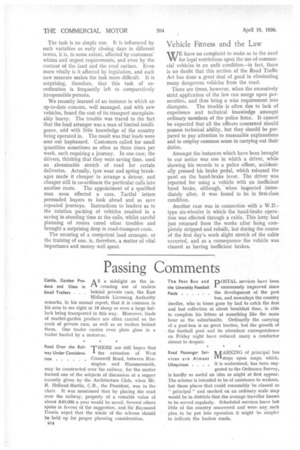Economy in Loading and Routeing
Page 27

Page 28

If you've noticed an error in this article please click here to report it so we can fix it.
WHEN suitable vehicles have been chosen, adequate maintenance arranged, and good drivers selected, there remains a most important function to be carried out. It is possible for this to mean the difference. between economic and cripplingly costly operation. We refer to the organizing of routes and load assemblies. In a ship the aim of the stevedore is so to load a vessel that at each port of call the cargo presents itself automatically, that is, when the goods for one port are unloaded, they uncover the goods for the next. But the stevedore's task is even more to co-ordinate the cargo positions so that the vessel is always on an even keel.
Load and route arranging in road transport are similar. It is the co-ordination of routes, loads and loading in such a manner that the scheme as a whole is in balance, calls arranged in the best sequence, loads present themselves automatically at each call, and that calls are woven into the best route available so as to reduce to the minimum redundant and empty mileage. The task is no simple one. It is influenced by such variables as early closing days in different towns, it is, to some extent, affected by customers' whims and urgent requirements, and even by the contour of the land and the road surface. Even more vitally is it affected by legislation, and each new measure makes the task more difficult. It is surprising, therefore, that this task of coordination is frequently left to comparatively irresponsible persons.
We recently learned of an instance in which an up-to-date concern, well managed, and with new vehicles, found the cost of its transport unexplainably heavy. The trouble was traced to the fact that the load arranger was a man of limited intelligence, and with little knowledge of the country being operated in. The result was that loads were sent out haphazard. Customers called for small quantities sometimes as often as three times per week, each requiring a journey. In one case, the drivers, thinking that they were saving time, used an abominable stretch of road for certain deliveries. Actually, tyre wear and spring breakages made it cheaper to arrange a detour, and cheaper still to co-ordinate the particular calls into another route. The appointment of a qualified man soon effected a Cure. Tactful letters persuaded buyers to look ahead and so save repeated journeys. Instructions to loaders as to the rotation packing of vehicles resulted in a saving in standing time at the calls, whilst careful planning of routes cured other troubles and brought a surprising drop in road-transport costs.
The securing of a competent load arranger, or the training of one, is, therefore, a matter of vital importance and money well spent.
Vehicle Fitness and the Law
WE have no complaint to make as to the need for legal restrictions upon the use of commercial vehicles in an unfit condition—in fact, there is no doubt that this section of the Road Traffic Act has done a great deal of good in eliminating many dangerous vehicles from the road.
There are times, however, when the excessively strict application of the law can merge upon persecution, and thus bring a wise requirement into disrepute. The trouble is often due to lack of experience and technical knowledge amongst ordinary members of the police force. It cannOt be expected that all the officers concerned should possess technical ability, but they should be prepared to pay attention to reasonable explanations and to employ common sense in carrying out their duties.
Amongst the instances which have been brought to our notice was one in which a driver, while showing his records to a police officer, accidentally pressed his brake pedal, which released the pawl on the hand-brake lever. The driver was reported for using a vehicle with an inefficient hand brake, although, when inspected immediately after, it was found to be in first-class condition.
Another case was in connection with a W.D.
• type six-wheeler in which the hand-brake operation was effected through a cable. This lorry had just returned from the works after being completely stripped and rebuilt, but during the course of the first day's work slight stretch of the cable occurred, and as a consequence the vehicle was classed as having inefficient brakes.




















































































